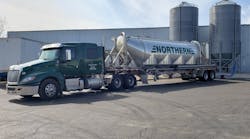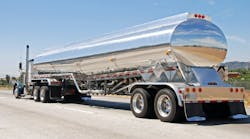The 2014 fourth-quarter Transport Capital Partners (TCP) survey found carriers were likely to increase wages and hire more inexperienced drivers because attracting and retaining drivers remained an issue.
In the fourth quarter Transport Capital Partners (TCP) survey, over 90% of carriers reported driver wage increase expectations. More than one-third said they expect wage increases to be in the range of 6-10%--double what was reported six months ago.
Capacity is tight, and carrier costs are rising, with rates responding. “However, carriers remain hesitant to add capacity because of a shortage of experienced drivers, with replacement far outpacing additions on order boards for new tractors,” said Richard Mikes, TCP partner and survey leader.
Steven Dutro, TCP partner, added: "Carriers are seeing potential applicants go to other sectors, like construction, where there is more predictable home time and where extra pay is not limited by Federal hours-of-service regulations. The end result is that revenue from rate increases will go into purchasing new equipment, driver wages, rising maintenance costs, and regulatory costs--and not as much into the carrier’s pockets in 2015."
For years, there has been a proposal to allow younger drivers (under 21 years old) to drive, with proper training, in interstate commerce. According to the TCP survey, the concept enjoys large support in the industry--84% of carriers are in favor. Support is similar between large and small carriers, despite smaller carriers typically hiring fewer inexperienced drivers.
Although over 80% of the industry supports hiring younger drivers, the percentage of carriers actually hiring inexperienced drivers is only 33%. Despite the shortage of qualified drivers, there has yet to be a major shift to hiring entry-level drivers.
“It is likely that the shift to hiring more inexperienced drivers will continue, albeit slowly—64% of carriers surveyed indicated they would be interested in hiring less experienced drivers,” Mikes said. “Larger companies are twice as likely to hire inexperienced drivers as smaller companies, perhaps because they have the staff and resources to invest in training facilities and co-drivers.”








